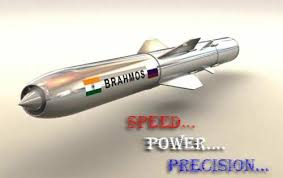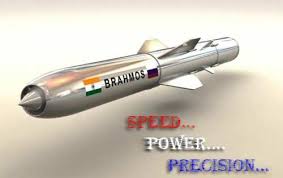
The world's fastest supersonic cruise missile is being claimed to have been developed by BrahMos Aerospace which is a joint venture between Indian and Russia.
And for the second largest economy of the world, this is a potentially concerning development because that rocket is being planned to be exported globally.
There were ingoing discussions "with a number of countries," a spokesperson of BrahMos told the media at the Singapore Airshow. The spokesperson added that only "responsible" nations that are friendly with both New Delhi and Moscow would be sold the missiles.
With a flight range of nearly 300 kilometers, the state-of-the-art BrahMos missile has caught the attention of a number of Southeast Asian countries such as Malaysia, Indonesia and Vietnam.
But from the Chinese point of view, Hanoi buying the rockets would be viewed as an escalation of the conflict between Beijing and Hanoi as the two are presently engaged in a territorial tussle in the South China Sea.
Shashank Joshi, senior fellow for international affairs at the Tony Blair Institute for Global Change and senior research fellow at the Royal United Services Institute for Defence and Security Studies said that if the transaction materializes, "that would demonstrate an Indian willingness to arm a state right on China's doorstep for the first time".
While officials in Hanoi have already given indications of a possible deal, the Indian administration has denied all reports of a potential deal.
With capabilities to be launched from land, sea and air, the BrahMos has been christened as "the carrier killer". According to the firm, compared to most of the existing cruise missiles systems, this new system is more cost-effective because it requires low maintenance. Bunkers and radar systems and similar enemy assets would be able to be targeted precisely by the rocket. This is similar to the functioning and effectiveness of the U.S. Tomahawk missiles with respect to the destruction of the infrastructure of the Islamic State.
Sameer Patil, director of the Centre for International Security at Mumbai-based think-tank Gateway House said that Beijing would be concerned with the potential sales.
The missile "will significantly upgrade military capabilities of any country buying it," he warned. "This is particularly true for some Southeast Asian countries, which have a territorial dispute with China."
There were no comments from China's foreign ministry.
Joshi explained that the missile's current range means that "if India wanted to use it from the sea, it would have to get dangerously close to the enemy's shoreline". "From the air, it would only be able to strike a limited number of Chinese targets in Tibet." But "Russia and India are working to double the range of the missile, and this will make it more flexible and dangerous," he added.
New Delhi and Beijing are suspicious about the political ambitions of each other and there have been multiple border tensions and skirmishes between the two nations. But on the other hand, Russia would be mindful about the concerns of China while finalizing any deal for the missile because Moscow has a more strategic relationship with China.
(Source:www.cnbc.com)
And for the second largest economy of the world, this is a potentially concerning development because that rocket is being planned to be exported globally.
There were ingoing discussions "with a number of countries," a spokesperson of BrahMos told the media at the Singapore Airshow. The spokesperson added that only "responsible" nations that are friendly with both New Delhi and Moscow would be sold the missiles.
With a flight range of nearly 300 kilometers, the state-of-the-art BrahMos missile has caught the attention of a number of Southeast Asian countries such as Malaysia, Indonesia and Vietnam.
But from the Chinese point of view, Hanoi buying the rockets would be viewed as an escalation of the conflict between Beijing and Hanoi as the two are presently engaged in a territorial tussle in the South China Sea.
Shashank Joshi, senior fellow for international affairs at the Tony Blair Institute for Global Change and senior research fellow at the Royal United Services Institute for Defence and Security Studies said that if the transaction materializes, "that would demonstrate an Indian willingness to arm a state right on China's doorstep for the first time".
While officials in Hanoi have already given indications of a possible deal, the Indian administration has denied all reports of a potential deal.
With capabilities to be launched from land, sea and air, the BrahMos has been christened as "the carrier killer". According to the firm, compared to most of the existing cruise missiles systems, this new system is more cost-effective because it requires low maintenance. Bunkers and radar systems and similar enemy assets would be able to be targeted precisely by the rocket. This is similar to the functioning and effectiveness of the U.S. Tomahawk missiles with respect to the destruction of the infrastructure of the Islamic State.
Sameer Patil, director of the Centre for International Security at Mumbai-based think-tank Gateway House said that Beijing would be concerned with the potential sales.
The missile "will significantly upgrade military capabilities of any country buying it," he warned. "This is particularly true for some Southeast Asian countries, which have a territorial dispute with China."
There were no comments from China's foreign ministry.
Joshi explained that the missile's current range means that "if India wanted to use it from the sea, it would have to get dangerously close to the enemy's shoreline". "From the air, it would only be able to strike a limited number of Chinese targets in Tibet." But "Russia and India are working to double the range of the missile, and this will make it more flexible and dangerous," he added.
New Delhi and Beijing are suspicious about the political ambitions of each other and there have been multiple border tensions and skirmishes between the two nations. But on the other hand, Russia would be mindful about the concerns of China while finalizing any deal for the missile because Moscow has a more strategic relationship with China.
(Source:www.cnbc.com)





